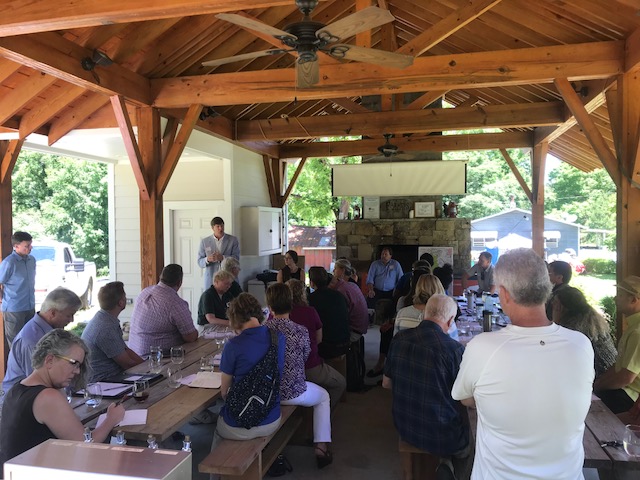
For most of us starting a new job, orientation involves sitting in a room for the better part of a day learning company history and where the paperclips are kept. For the job David Knight’s new job, orientation involved traveling the state and talking with people about outdoor adventure.
In January, Knight was named the first director of the N.C. Department of Commerce’s new Outdoor Industry Recruitment Office. His mission: to help North Carolina capitalize on an industry that already:
- Is responsible for 260,000 direct jobs
- Pays $18.3 billion a year in the wages and salary
- Is responsible for $28 billion in consumer spending
- Brings in $1.3 billion in state and local tax revenues
“We want to show the impact that outdoor recreation has on the state and build on that to bring more outdoor recreation business here,” says Knight, who holds a law degree from Wake Forest University and has a range of policy experience in the outdoors, from serving as director of government relations for The Nature Conservancy in North Carolina to serving as assistant secretary for Natural Resources at the N.C. Dept. of Environmental and Natural Resources (now the Department of Environmental Quality.
One of the nation’s first
When his office opened in January, with funding allocated by the 2017 North Carolina General Assembly, North Carolina was only the fourth state in the nation to have an office promoting outdoor recreation. Six states have since added similar offices. Knight and his Outdoor Industry Recruitment Office are now part of the state’s Economic Development Partnership, whose goal is to bring new business to the state and support existing businesses.
Knight’s “orientation” included holding 13 “listening sessions” across the state, bringing together local officials and folks in the outdoors industry.
“We wanted to find out on the local level what the outdoor industry needs to grow,” says Knight.
Preliminary findings
Knight’s last session was in September. He’s still sifting through the feedback to file a report with the legislature, but a few key areas of improvement and focus surfaced that Knight believes will indeed help North Carolina grow its outdoor recreation industry. Those areas include:
- Adding Lodging. “I use the Uwharries as a case study,” says Knight of the 50,000-acre Uwharrie National Forest and adjoining recreational amenities within an hour’s drive of Charlotte and the Triad, and an hour and a half from the Triangle. Despite there being more than 200 miles of trail (including hiking, mountain biking, equestrian and ORV), extensive paddling, fishing, hunting, and road biking, “there are few places to stay, including camping and having a roof over your head,” says Knight. “We need to get the lodging industry to look differently at how to bring in people.”
- Adding additional infrastructure. “Anymore, you need to have a brewery, you need to have a coffee shop,” says Knight. “Millennials in particular, when they visit a place, they want a unique experience, when they live in a place they want a unique experience. Look at all the great little towns down around the Uwharries.” He points to the tiny town of Star (population 800-ish) in Montgomery County and StarworksNC, where an arts community is beginning to thrive.
- Promoting our natural assets. North Carolina may have the most diverse offering of outdoor recreation options of any state in the country, from premier wreck diving off the coast to skiing in the mountains, and with so much else in between. “We need to work on our messaging, our branding, our promoting to let people know what we have.” He’s quick to add that that branding must be “unique, but also authentic.”
- Encouraging the little guy. “I’d love to have a grant program or offer zero-interest loans to, say, a small outfitter interested in opening up in a rural area.” A particularly ripe area: the vast network of paddle trails in Eastern North Carolina, where, “as I understand it, there’s no one you can rent a boat from, to put you in, then pick you up downstream.”
- Narrowing the rural/urban divide. Because the state’s recreational assets are so widespread, attracting outdoor manufacturing and other types of industry to the state is essential. “We’ve got a history of mills in the state, we should be able to capitalize on that and bring in outdoor-related manufacturing,” noting that already, sock manufacturers Farm-to-Feet and Renfro are prominent fixtures in the Mount Airy area. “And we should be able to build on the modern work-from-home economy.” One drawback to the latter: a lack of broadband in many rural areas. “I’m not saying outdoor recreation is the answer for rural areas, but it is an answer.”
The economy, and more
It’s not strictly the economic benefits that his office is promoting. “We talk a lot about the economic benefits to the state, but there are also the health benefits. I mean, everyone knows it’s good for us to get outside.” A bigger outdoor industry is good for both our physical and mental well-being.
And, he adds, outdoor recreation is also an industry that doesn’t negatively affect the state.
“This isn’t an extractive industry,” says Knight. “Outdoor recreation takes nothing out of the state.”
“I think it’s an exciting time for the state to focus on growing the economy on its outdoor benefits.”
* * *
Learn more
To learn more about North Carolina’s Outdoor Industry Recruitment office, follow it’s Facebook page, here.
